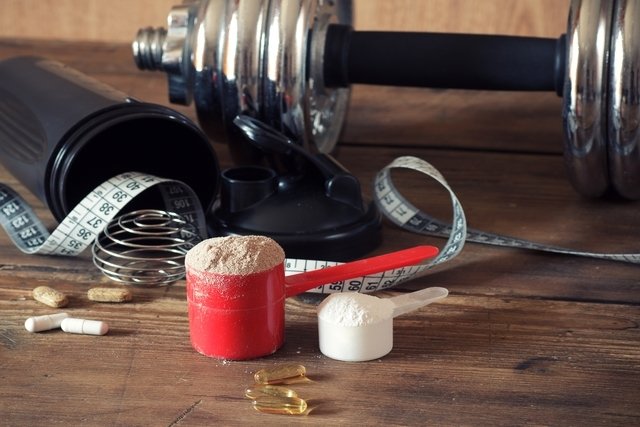Supplements to gain muscle mass are a good way to complement your diet, as they help to improve performance during physical activities and contribute to muscle recovery after exercise.
Whey protein, casein and creatine are some of the protein supplements that, when accompanied by a balanced diet, promote muscle mass gain. See how to follow a diet to gain muscle mass.
However, taking high amounts of supplements to gain muscle mass can cause kidney failure and, therefore, should only be consumed under the guidance of a nutritionist or nutritionist. Understand better what it is and how to avoid kidney failure.

Main supplements
The main supplements that can be used to gain muscle mass are:
1. Whey protein
Whey protein is a protein supplement made from cow, sheep or goat’s milk whey, which helps increase strength and physical performance during training.
Furthermore, whey protein improves muscle recovery after exercise and helps with muscle mass gain. Learn more about whey protein.
There are different types of whey protein, according to the concentration of protein, carbohydrates and fat:
- Concentrated whey protein: has up to 80% protein, a greater amount of calories, carbohydrates, lactose and fat;
- Whey protein isolate: has a minimum of 90% protein, fewer calories, carbohydrates and fats than concentrated whey;
- Hydrolyzed whey protein: it has a minimum of 90% protein, with low amounts of calories, carbohydrates and fats, and has better digestion, as the proteins are already digested, that is, divided into amino acids.
How to use: The amount of whey protein varies according to each person’s nutritional needs and daily protein consumption. However, it is generally recommended to dilute 20 to 40 g of the supplement in water or juice and drink it before or within 2 hours after resistance training.
2. Creatine
Creatine is an amino acid that can be found in red meat, fish and seafood. However, in supplement form it has higher concentrations and is indicated to improve physical performance during physical activity and help gain muscle mass.
Furthermore, creatine consumption also prevents cramps and injuries during exercise and improves post-workout muscle recovery. There are some types of creatine, and the most recommended form is monohydrate, as it is better absorbed and provides better results.
How to use: Creatine supplementation can be done in various ways according to the objective and individual needs, with the intake of 0.3g/kg of body weight for 7 days being normally recommended and, after this period, the consumption of 3 to 5 g of creatine per day. Understand better how to take creatine.
Learn more about the benefits of creatine in the following video:
3. BCAA
BCAA is a supplement that contains essential amino acids for the body, such as leucine, valine and isoleucine. Discover all the health benefits of BCAA.
This supplement has been recommended for athletes and those who practice regular physical activities, as it is believed that BCAA can reduce protein degradation and, thus, promote muscle mass gain or prevent muscle loss.
However, there are only a few limited scientific studies that have failed to prove this possible benefit of BCAA in gaining muscle mass.
How to use: Generally, the recommended BCAA intake is 2 capsules, one to three times a day, between meals and after training, or 5 g of this powder supplement diluted in 100 mL of water or juice.
4. Casein
Casein is a complete protein present in large quantities in cow’s, goat’s or sheep’s milk, which increases muscle production, contributing to muscle mass gain in athletes and those involved in physical activities.
How to use: the amount of casein varies according to the objective, health status and individual physical activity practices, being generally recommended between 0.8 and 2.2g/kg of body weight per day, which should be mixed with 200 ml of water or fruit juice, after exercise or 30 minutes before bed.
Read too: Casein: what it is, what it is for, types and how to take it
tuasaude.com/caseina
5. Maltodextrin
Maltodextrin is a supplement that helps with muscle mass gain, as it is a type of carbohydrate that is quickly absorbed by the body, helping to improve physical performance in those who practice strength training, such as bodybuilding and calisthenics, for example.
How to use: it can be taken before, during or after training and the amount of maltodextrin generally recommended is 10 to 30 grams, which must be diluted in 200 to 300 ml of water or another drink.
Read too: Maltodextrin: what it is, what it is for and how to take it
tuasaude.com/maltodextrina
6. Glutamine
Glutamine is an amino acid that can be found in foods such as meat, fish, eggs, legumes and some vegetables. Furthermore, glutamine is also found in higher concentrations, in the form of a nutritional supplement, in capsules or powder.
Glutamine supplements have higher concentrations of this amino acid and are believed to promote muscle mass gain by perhaps increasing cell volume and stimulating the production of proteins and glycogen.
However, there is no scientific evidence that proves that the use of glutamine supplementation promotes muscle mass gain.
How to use: the generally recommended amount of glutamine is 8 to 15 grams daily, divided into 2 to 3 times throughout the day, diluted in drinks such as water or juice.
7. L-carnitine
L-carnitine is an amino acid naturally produced by the liver and kidneys from essential amino acids, such as lysine and methionine, which is present in some foods, such as meat and fish.
The L-carnitine supplement contains a higher concentration of this amino acid and, therefore, could help gain muscle mass, as it appears to improve performance and physical performance in athletes and those involved in long-term physical activities. See other indications for L-carnitine.
However, more scientific studies are still needed to prove the benefits of L-carnitine in improving physical performance and gaining muscle mass.
How to use: The carnitine recommendation typically ranges from 2 to 4 grams of powder or capsules per day, which can be consumed all at once or divided throughout the day.
8. Vegetable proteins
Vegetable proteins, from pea, soy, rice or pumpkin seeds, are supplements that have been recommended especially for vegetarians or people with food intolerances or allergies.
These supplements are rich in proteins of a quality very similar to animal proteins, being important for improving physical resistance and promoting muscle mass gain in athletes, bodybuilders and those who practice physical activity.
How to use: Vegetable proteins can be sold alone or in combination, and the recommended intake is 30 g of protein, added to 250 ml of water, juice or added to fruit, once a day.
9. Arginine
Arginine is an amino acid generally considered important for increasing blood flow, as it could increase the supply of nutrients and hormones, such as GH, improving training performance and promoting muscle mass gain.
However, as studies that have evaluated the effect of arginine supplementation on muscle mass gain are limited, the use of this supplement for this purpose is currently not recommended.
How to use: L-arginine is found in capsule or powder form and generally the recommended intake is up to 3 g of the powder supplement, diluted in water or another drink once a day, or 1 to 2 capsules of 500mg up to 3 times per day.
Care when using supplements
People with an allergy to milk protein should not consume casein and whey protein supplements.
Anyone who has a kidney or liver problem should always consult a doctor before starting to use glutamine, BCAA, creatine, arginine and casein, as these supplements can harm the functioning of these organs.
Arginine supplementation is not recommended for anyone under 18 years of age. People with viral infections, such as herpes, should also not take this supplement.
Prolonged intake and high doses of supplements to gain muscle mass can cause kidney failure and, therefore, should only be consumed under the guidance of a doctor or nutritionist.

Sign up for our newsletter and stay up to date with exclusive news
that can transform your routine!
Warning: Undefined array key "title" in /home/storelat/public_html/wp-content/plugins/link-whisper-premium/templates/frontend/related-posts.php on line 12
Warning: Undefined array key "title_tag" in /home/storelat/public_html/wp-content/plugins/link-whisper-premium/templates/frontend/related-posts.php on line 13



